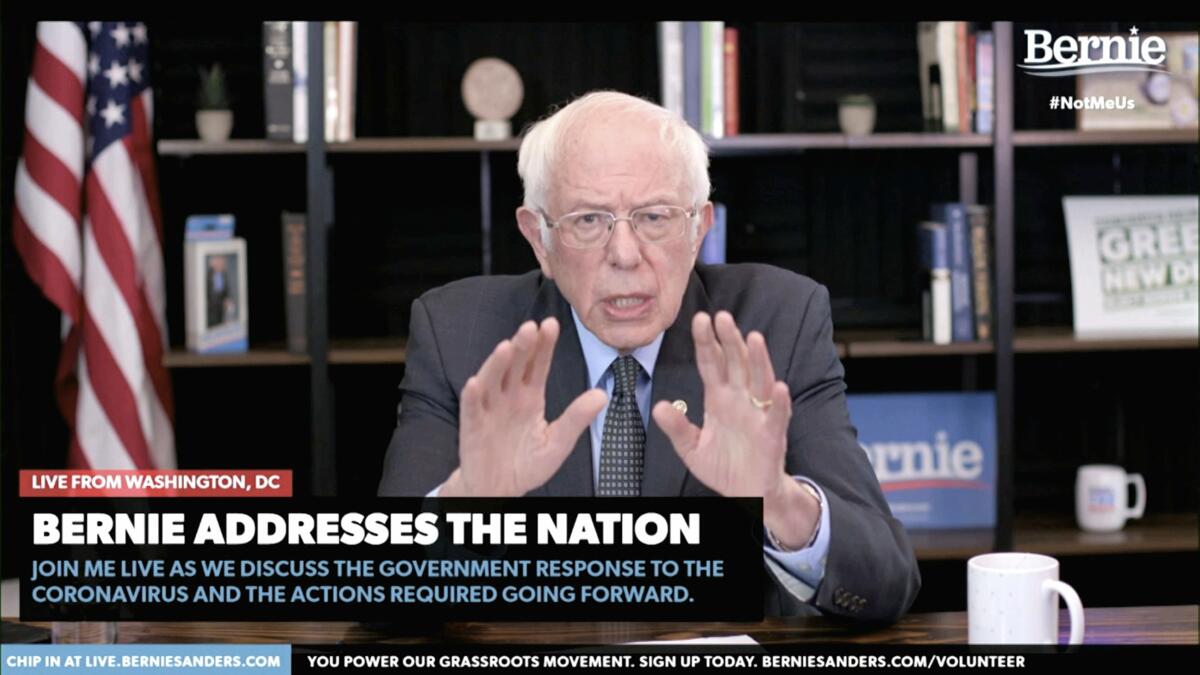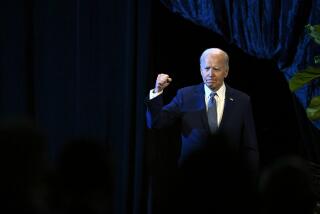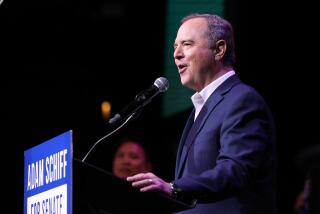Bernie Sanders set to ‘assess’ campaign, top aide says

- Share via
WASHINGTON — After getting crushed in another round of presidential primary voting Tuesday, Bernie Sanders keeps pushing on — but it is unclear to where and for how long.
In a statement Wednesday morning, Sanders’ campaign manager Faiz Shakir said the senator was assessing what to do next but suggested Sanders might take some time before announcing a decision.
“The next primary contest is at least three weeks away,” Shakir said. “Sen. Sanders is going to be having conversations with supporters to assess his campaign. In the immediate term, however, he is focused on the government response to the coronavirus outbreak and ensuring that we take care of working people and the most vulnerable.”
In a more specific email sent to supporters, Shakir offered a blunter version of the message.
“No sugarcoating it, last night did not go the way we wanted,” he said. After Sanders votes in the Senate on Wednesday on pending coronavirus-response legislation, he and his wife, Jane, would fly home to Vermont to “begin holding conversations” about the future, Shakir added.
In the end, however, the senator doesn’t have many options. Paths to the nomination have closed off. Sanders’ movement seems weaker each time voters go to the polls. The coronavirus pandemic has muzzled his megaphone, making it impossible to hold the big rallies that are the lifeblood of his movement.
Now he faces a choice that is not just about his campaign, but also about the movement he has been building his entire political career.
Sanders faced an immediate groundswell of calls to quit the 2020 presidential contest after Tuesday’s primaries in Florida, Illinois and Arizona gave former Vice President Biden another big round of victories. But party leaders are still approaching the situation gingerly because, more than anything, they want Sanders’ campaign to end in a way that does not alienate his energetic, youthful supporters.
“The critical strategy here is to give Bernie the time and space he needs to make the decision and to galvanize his supporters, and if that takes another couple weeks, so be it,” said former New York Rep. Steve Israel, a Biden supporter. “The worst strategy would be to try to muscle him out and fester resentment among his supporters.”
Even some of his supporters say the choice for Sanders now is more about how he can best influence the party, not how he can preserve a chance to win the nomination.
“His campaign is going to have to make a decision about his path forward … how to make sure the profound impact he has had on politics over the last five years translates into long-term gains,” said Neil Sroka, spokesman for Democracy for America, a progressive group backing Sanders.
Larry Cohen, head of Our Revolution, a Sanders-aligned group, said he believed progressives’ best strategy for 2020 and beyond was for Sanders to stay in the race, accrue more delegates, and use their voice to shape the platform and party rules at the convention.
“Our movement continues to support Bernie Sanders through the last primary whenever that occurs,” said Cohen. “These primaries not only nominate other candidates, they determine the future of the Democratic Party, including platform drafting.”
Indeed, some down-ballot Democrats might benefit from Sanders remaining on the ballot and continuing to help increase party turnout. In Wisconsin, for example, the state’s primary, scheduled for April 7, includes not just the presidential primary but also a general election for a contested state Supreme Court seat that Democrats are hoping to flip.
Sanders’ current decision point comes after Biden’s victories in Florida, Illinois and Arizona on Tuesday night have pushed the former vice president’s delegate tally past 1,100, according to the Associated Press. It takes 1,991 delegates to clinch the party’s nomination.
It is all but impossible for Sanders to close the gap unless he were to win the remaining primaries by landslide margins, which he is unlikely to do. He would need to win more than 60% of the remaining delegates, and he has not yet won 60% of delegates in any primary this year.
President Trump took his attention away from the coronavirus crisis Wednesday morning to weigh in on Twitter as a political pundit:
“The DNC will have gotten their fondest wish and defeated Bernie Sanders, far ahead of schedule. Now they are doing everything possible to be nice to him in order to keep his supporters,” Trump said.
The coronavirus pandemic has essentially ended — even sidelined — the presidential campaign as Democrats have known it. Primary elections are being postponed, as party leaders struggle to expand mail-in voting. Biden and Sanders have been forced to go all-digital in their outreach to voters — a bigger sacrifice for Sanders, whose rallies were electrifying while Biden’s were not.
Media attention has been diverted to the public health crisis, depriving Sanders of the oxygen he would need to engineer a comeback even if there were a path.
Adapting to the new, overwhelming reality, Sanders is focusing on using his platform to advance his healthcare agenda, arguing that the coronavirus crisis has laid bare crippling weaknesses in the U.S. healthcare system. He gave a video address on the coronavirus crisis Tuesday night even as he was losing primary elections across the country.
Some of his supporters ask “why not stay in?” because few primaries are scheduled in the coming weeks and more may be postponed. Georgia, for example, already has postponed its primary, which had been scheduled for March 24. The Alaska and Hawaii primaries scheduled for April 4 have few delegates at stake and could favor Sanders, who won those states in 2016.
Biden supporters are getting impatient, but the former vice president is already pivoting to a message more geared to the general election and reaching out to Sanders voters. Party leaders believe it would be counterproductive to turn up the heat.
“There is no point in pressuring; he’s going to do what he wants to do,” said Elaine Kamarck, a member of the Democratic National Committee. “He’s brought some valuable energy to the party. No one wants to lose the energy.”
But under the circumstances, the Sanders campaign seems headed toward an anticlimactic ending.
“I feel bad for Bernie Sanders that his candidacy is ending this way, with a whimper,” said Mark Longabaugh, who was an advisor to Sanders in his 2016 presidential run. “He’s not ending with a bang because there is nothing that can cut through.”
More to Read
Get the L.A. Times Politics newsletter
Deeply reported insights into legislation, politics and policy from Sacramento, Washington and beyond. In your inbox twice per week.
You may occasionally receive promotional content from the Los Angeles Times.











